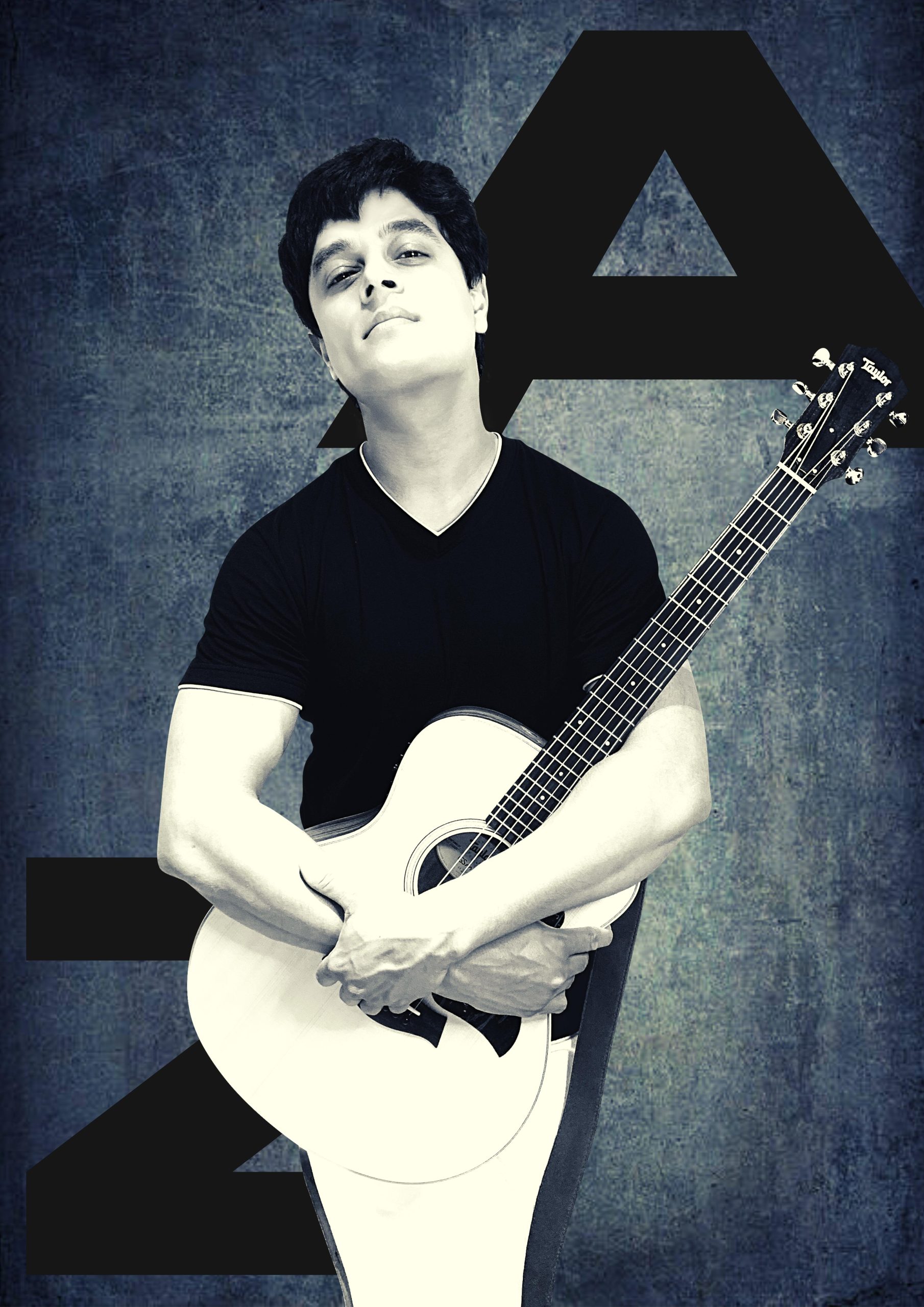(July 22, 2022) Who could have thought that one day, MCU fans would watch an heirloom bangle open an alternative dimension Noor in Marvel Studios’ latest offering Ms Marvel? But it’s happening and how! The world is in awe, seeing the very first Muslim South Asian superhero finding befitting representation in MCU. In between the buzz that surrounds Ms Marvel is Indian composer A-Zal whose songs Dheemi Dheemi and Aye Khuda have amped up the soundtrack of the much-talked-about series, exactly a year after serenading the global audience with his track Adhaan Maghbiri in Marvel’s Loki. Composing music for Marvel Studios has changed A-Zal’s life big time – as an artist and a music composer. “Ms Marvel is being received so well across the globe, and making music for such projects does add a big feather to your cap,” he tells Global Indian over a video call from NYC. Ask him if it’s the perfect validation for all the years of hard work, and pat comes the reply, “It’s the biggest authority stamp you could ask for.”

A-Zal
Starting his journey from making music for Bollywood to finding his feet in Hollywood, A-Zal calls it a long struggle. Working back home in an industry that made him “feel like a nobody” to “feeling like a lost kid” during his struggling days in the US, A-Zal had to work his way up. “I’m not glorifying my struggle. I have earned this, I deserve to be working with Marvel,” adds A-Zal who believes that representation is catching up. “You have to be talented enough to break the clutter.”
Corporate job to full-time musician
The Mumbai-born spent a considerable part of his childhood in London, thanks to his dad’s job in the aviation sector. The eclectic city introduced him to British pop in his formative years, which helped him form a deep connection with music. He didn’t begin training until the age of 10, however, when he first picked up a mouth organ. “One of my school friends used to play it so I asked him to train me. I could easily slide in my bag and play it whenever I wanted,” says the composer who graduated to playing the guitar, piano and later learned Hindustani classical and Carnatic music. While he excelled in his studies and even completed a degree in engineering, his love for music evolved into a concrete passion only after he stepped into the corporate world with KPMG. “It was an amazing start but I soon realised that I can either have a great bank balance in the near future or make my soul happy and have a profession where I look forward to every day, including Mondays,” he smiles. “It was there that I realised my love for music and how I was ready to make efforts to do anything to make my name in the world of music.”
That’s when he put a screeching halt on his short stint in the corporate world and dived into making music full time. With no godfather in the industry, he went through a phase “full of uncertainty.” But A-Zal continued upskilling himself with each passing day. “I learnt how to play almost every instrument – flute, violin, mridangam – so that when I am composing, I can instruct a flautist as to what I exactly want.” The initial two years were full of struggle where A-Zal says he was often “taken for a ride” thinking he was a young kid on the block. “I didn’t earn a single penny in those years, and used up all my savings.” Undeterred, he kept at it and found his first big break with the 2013 film Prague, which took him to the Cannes Film Festival. This international exposure landed him his second film Monsoon Shootout, as a composer. “The film made it to many international film festivals, and I realised my work was getting recognised internationally. I bagged a German film and a British documentary.”

The world is his stage
A-Zal calls 2014 a “turning point” in his life as the international exposure nudged him to “explore the world market.” “I told myself I need to win a Grammy or an Oscar one day, and Hollywood was the place to be for that.” He would visit the US twice a year to network more. From attending AFI Festival to making an appearance at Golden Globes screenings, Zal pulled every string to get in touch with the right people. One such visit got him to the door of Remote Control Productions to have an interview with Hollywood’s renowned film composer Hans Zimmer. Despite cracking two-three rounds, A-Zal lost the chance to work with Zimmer because he didn’t have a work visa. “That’s when I started working on my US work visa, and simultaneously did independent projects for New York University.” Starting afresh in a new country wasn’t easy, as A-Zal recalls he “felt like a lost kid.” “I was already doing good work back home and getting recognition. And I decided to swap that for a career in the US because I knew if I didn’t leave right now, I would be consumed by more projects.”
This conviction translated into fruitful results when America’s leading TV network CBS reached out to him for composing some music pieces for its action series NCIS: Los Angeles. “It changed things for me.” The show turned out to be a perfect opportunity in cementing his position as a composer to look out for, and he soon saw himself making music for another popular show, The Twilight Zone.
Marvel-ous inning
Impressed by his body of work, Marvel Studio approached him to prepare a music piece for the Loki Series. In keeping with the confidentiality terms of the project, Marvel only divulged a synopsis of the scene and A-Zal had to compose from this limited information. But he proved his mettle with the track Adhaan Maghbiri which took the climax to a crescendo. And now, he is once again making headlines for belting out songs – Aye Khuda and Dheemi Dheemi – for MCU’s Ms Marvel. Does he feels the pressure every time he composes for Marvel? “I don’t. These projects get me super excited. I can’t give them anything good, it has to be the best. While working with Marvel, you work like a marvel.”
Although Marvel likes to keep a lid on every project before its official announcement, A-Zal found a very clear brief to help him navigate, and compose music for the series. “Aye Khuda is an important song that establishes the relationship between Kamala and Kamran in the film. I was told to bring the essence of their origin and include a Sufi touch to the song,” reveals A-Zal who initially found it tough to blend such a melody for a young character like Kamala. But he loves a challenge and ended up sending around 14-15 tracks to Marvel, among which Aye Khuda made the final cut – a song that took three months to complete.
The film composer, who is keen to create a legacy of work that identifies with him, is looking forward to releasing his upcoming album 17 & 11 Nights. “For the longest time, I have composed music according to others’ briefs. But now I want to tell my own stories, where I am the character, I am the voice and I am the words,” says A-Zal who now wants to make music as a form of self-expression. As an artist, he believes his “scores are experimental and ahead of time, and that’s how I want to be identified as a composer.” For the Mumbai born, working in America has been a learning curve. From producing music that has “no rough edges” to taking no shortcuts while writing or producing music, A-Zal had to unlearn and relearn a lot.
View this post on Instagram
Many years ago, AR Rahman won the world with Jai Ho, a song that put India on the global map. And now A-Zal is attempting to bring the South Asian flavour into the mainstream with his work. The Indian composer is happy that the music scene is evolving, and there is more inclusivity and diversity. “In the US, you would find more of browns and blacks on television than whites. That’s how conscious the brands are right now. But there is more to it,” he says, adding, “With digitisation, you don’t have to depend on the records, instead you can showcase your talent on YouTube. It can help start a dialogue and initiate a conversation.” He is ecstatic that representation is at the forefront as it “propels your exposure” but more than that he is delighted about the “acceptance”. “People are now embracing world music.” Recalling his struggling days in the US, A-Zal says “things were much easy in the US as it’s a country of immigrants. They embraced my music for which I am thankful.” It’s a lesson that A-Zal carries with him, and has made him humble. “It becomes a part of you.”



